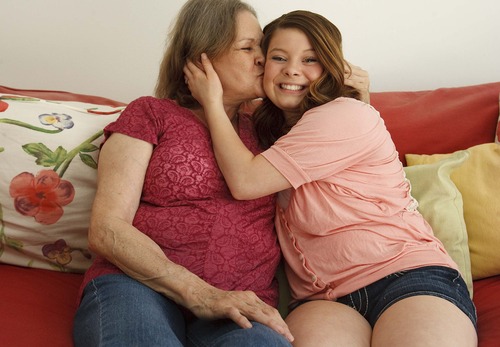This is an archived article that was published on sltrib.com in 2013, and information in the article may be outdated. It is provided only for personal research purposes and may not be reprinted.
Danielle Cheek's first double cheeseburger came cold out of a prison vending machine, not off her dad's grill. Maycie Nielsen had to balance the thrill of a Toys R Us shopping spree with the knowledge her parents funded it with money stolen from her grandparents.
Mariah Williamson can remember crying at age 13, watching her mother throw things around the house before she turned herself into police for another cluster of drug and identity-theft charges. Their relationship only recently gained an element of trust.
"Me and my mother are at an aunt/niece kind of relationship," Williamson said. "I don't give her the title 'Mom' because she's never really been there to fill that role."
While coping with the instability caused by having incarcerated parents, each of the girls excelled academically. Their diligence has paid off, with the trio and Whitney Curtis chosen as the first recipients of the Willy the Plumber scholarships for children of inmates.
Karl "Willy" Winsness, the ex-con who founded the scholarships, sees such children as "unseen victims of crime."
The scholarship provides $1,000 to three college-bound students and $500 to one trade-school hopeful. Applicants must have a 2.0 GPA and prove a parent's incarceration.
Williamson's scholarship is one step toward her plan to be a nurse practitioner. The University of Utah awarded her a full four-year scholarship, room and board included.
Cheek is pursuing a degree in human biology at University of California San Diego. She remembers writing an angry letter to her imprisoned father at age 13, after she started to see and appreciate the closeness of other families.
With any luck, she said, her father will be done with his sentence on drug charges by the time she finishes medical school.
Nielsen plans to be a teacher and is pursuing an elementary education degree at Utah Valley University.
Winsness conceived the scholarships a few years ago, but he had difficulty raising funds. Last year, the Community Foundation of Utah began helping him find donors.
"Karl is the absolute symbol of what a community is for and what it can do," said Frazier Nelson, the foundation's executive director. "A lot of people didn't believe him. But all of us have a responsibility and capability to help the community, and that's exactly what he's done."
The foundation invests donated money into businesses and commodities to create a self-sustaining revenue stream. "The idea is that these assets stay around forever," Nelson said.
Winsness said he had to turn down several worthy applicants, based on current funding.
"It felt great to get that many great, fantastic applicants," he said, "then a bit overwhelming knowing that we couldn't help that many."
Williamson hopes others in her situation can take comfort in her success. "I want other children to know that they don't have to stop [schooling] just because they have no way to pay for it," she said.



